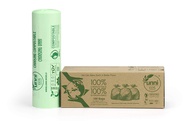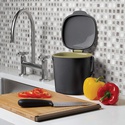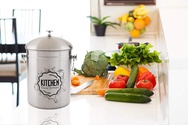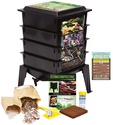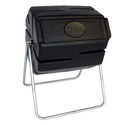The simple definition of “composting,” according to Wikipedia, is “organic matter that has been decomposed.” Over the years, this process has become more and more popular in homes across the country. Several cities have rolled out programs that provide compost bins to homes, and collect it separately from trash and recyclables.
Not only does compost reduce the amount of waste you toss out every week, but it is extremely beneficial to the environment. Collecting old food scraps, soiled materials, and yard waste are easier than you think. If you do not live in a city that has a compost program, here is everything you’ll need to start this process at home.
Containers
Keeping a bin in the kitchen to aid in the collecting of food scraps to take outside is a great idea. A stainless-steel bin will help keep odor to a minimum. If the odor is not an issue, or you don’t mind emptying it as often, a small plastic container will do the trick. You can also recycle a sizeable container that has been used before (coffee tin or ice cream pail). You will want to use something with a lid that can be easily emptied. This container can be kept on the counter, under the sink, or in a cabinet.
Outside containers take a bit more thought and neighborly consideration. If you have no outdoor space or a small patio area, consider a worm bin. For those who have a bigger space but still close to neighbors, consider a compost tumbler. You will want to “turn” your compost pile at least once every three days, or when it starts to smell. Keep your compost collection area in the shade. This will help with the odor.
Bags
Keeping a bag in the bin in your kitchen will save a lot of time and energy that you would be wasting by constantly washing it. You cannot use a plastic bag, as those do not break down in the composting cycle. Find a disposable compost bag. Make sure the bags are BPI-certified. Paper bags can be used to collect larger composting materials, such as grass or yard clippings.
Make sure the bag says “compostable,” as opposed to “biodegradable.” There is a subtle but key difference. A biodegradable bag will break down, but it will take a longer time. These should be used to collect regular trash. A compostable bag breaks down quicker.
Moisture and heat cause compostable bags to break down quicker. Moisture and heat are also two things that can collect quickly in your countertop receptacle. Make sure to keep an eye on the bag and be cautious when taking it outside.
What Can (and Cannot) be Composted
Now that you’ve got your materials, it’s time to start composting. Here is a list of things that can and should be composted:
- Yard waste (grass clippings or leaves)
- Soiled paper (pizza boxes, used napkins, etc.)
- Black and white newspaper
- Vegetable and fruit food scraps (rinds, peels, skins)
- Coffee grounds and filters
- Old leftover food
Things that should NOT be composted:
- Meat (raw or cooked)
- Pet waste
- Fats and oils
- Diseased yard waste (or anything that has been exposed to pesticides)
At Home Tips
The number one tip for composting at home is to have a tight-fitting lid on the container you keep in your kitchen. This cannot be stressed enough. It will keep the odor to a minimum, and also keep out the fruit flies and other critters.
Cut down food into smaller pieces. The smaller the food scraps, the quicker they will break down. The quicker they break down, the sooner your compost will become soil that can be used in the garden.
If you are not someone who eats at home regularly but are still interested in composting, consider keeping your collection bin in the refrigerator. This will save counter space. It will also keep the odor to a minimum, the pests away, and will allow you to collect scraps for a longer period of time. You will still want to make sure it has a lid on it.
The key to successful composting begins with knowing what can and cannot be composted. Consider printing off a guide and place it somewhere in your kitchen that is easy to see, to act as a reminder to yourself and others.
Wishing you the best of luck in your composting efforts!






